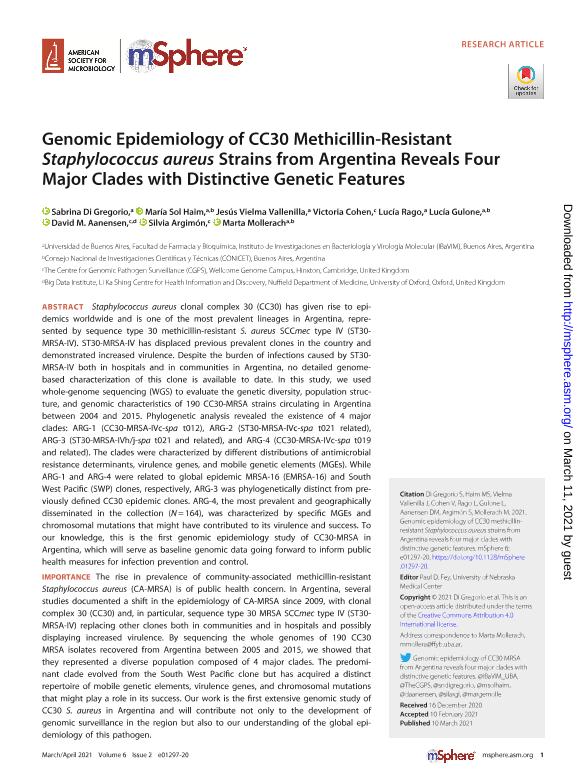Artículo
Genomic Epidemiology of CC30 Methicillin-Resistant Staphylococcus aureus Strains from Argentina Reveals Four Major Clades with Distinctive Genetic Features
Di Gregorio, Sabrina Noelia ; Haim, Maria Sol
; Haim, Maria Sol ; Vielma Vallenilla, Jesús Eduardo; Cohen, Victoria; Rago, Lucía; Gulone, Lucía
; Vielma Vallenilla, Jesús Eduardo; Cohen, Victoria; Rago, Lucía; Gulone, Lucía ; Aanensen, David M.; Argimón, Silvia; Mollerach, Marta Eugenia
; Aanensen, David M.; Argimón, Silvia; Mollerach, Marta Eugenia
 ; Haim, Maria Sol
; Haim, Maria Sol ; Vielma Vallenilla, Jesús Eduardo; Cohen, Victoria; Rago, Lucía; Gulone, Lucía
; Vielma Vallenilla, Jesús Eduardo; Cohen, Victoria; Rago, Lucía; Gulone, Lucía ; Aanensen, David M.; Argimón, Silvia; Mollerach, Marta Eugenia
; Aanensen, David M.; Argimón, Silvia; Mollerach, Marta Eugenia
Fecha de publicación:
04/2021
Editorial:
American Society for Microbiology
Revista:
mSphere
e-ISSN:
2379-5042
Idioma:
Inglés
Tipo de recurso:
Artículo publicado
Clasificación temática:
Resumen
Staphylococcus aureus clonal complex 30 (CC30) has given rise to epidemics worldwide and is one of the most prevalent lineages in Argentina, represented by sequence type 30 methicillin-resistant S. aureus SCCmec type IV (ST30- MRSA-IV). ST30-MRSA-IV has displaced previous prevalent clones in the country and demonstrated increased virulence. Despite the burden of infections caused by ST30- MRSA-IV both in hospitals and in communities in Argentina, no detailed genomebased characterization of this clone is available to date. In this study, we used whole-genome sequencing (WGS) to evaluate the genetic diversity, population structure, and genomic characteristics of 190 CC30-MRSA strains circulating in Argentina between 2004 and 2015. Phylogenetic analysis revealed the existence of 4 major clades: ARG-1 (CC30-MRSA-IVc-spa t012), ARG-2 (ST30-MRSA-IVc-spa t021 related), ARG-3 (ST30-MRSA-IVh/j-spa t021 and related), and ARG-4 (CC30-MRSA-IVc-spa t019 and related). The clades were characterized by different distributions of antimicrobial resistance determinants, virulence genes, and mobile genetic elements (MGEs). While ARG-1 and ARG-4 were related to global epidemic MRSA-16 (EMRSA-16) and South West Pacific (SWP) clones, respectively, ARG-3 was phylogenetically distinct from previously defined CC30 epidemic clones. ARG-4, the most prevalent and geographically disseminated in the collection (N = 164), was characterized by specific MGEs and chromosomal mutations that might have contributed to its virulence and success. To our knowledge, this is the first genomic epidemiology study of CC30-MRSA in Argentina, which will serve as baseline genomic data going forward to inform public health measures for infection prevention and control. IMPORTANCE The rise in prevalence of community-associated methicillin-resistant Staphylococcus aureus (CA-MRSA) is of public health concern. In Argentina, several studies documented a shift in the epidemiology of CA-MRSA since 2009, with clonal complex 30 (CC30) and, in particular, sequence type 30 MRSA SCCmec type IV (ST30- MRSA-IV) replacing other clones both in communities and in hospitals and possibly displaying increased virulence. By sequencing the whole genomes of 190 CC30 MRSA isolates recovered from Argentina between 2005 and 2015, we showed that they represented a diverse population composed of 4 major clades. The predominant clade evolved from the South West Pacific clone but has acquired a distinct repertoire of mobile genetic elements, virulence genes, and chromosomal mutations that might play a role in its success. Our work is the first extensive genomic study of CC30 S. aureus in Argentina and will contribute not only to the development of genomic surveillance in the region but also to our understanding of the global epidemiology of this pathogen.
Palabras clave:
CC30
,
MRSA
,
STAPHYLOCOCCUS AUREUS
,
GENOMIC EPIDEMIOLOGY
,
WHOLE-GENOME SEQUENCING
Archivos asociados
Licencia
Identificadores
Colecciones
Articulos(OCA HOUSSAY)
Articulos de OFICINA DE COORDINACION ADMINISTRATIVA HOUSSAY
Articulos de OFICINA DE COORDINACION ADMINISTRATIVA HOUSSAY
Citación
Di Gregorio, Sabrina Noelia; Haim, Maria Sol; Vielma Vallenilla, Jesús Eduardo; Cohen, Victoria; Rago, Lucía; et al.; Genomic Epidemiology of CC30 Methicillin-Resistant Staphylococcus aureus Strains from Argentina Reveals Four Major Clades with Distinctive Genetic Features; American Society for Microbiology; mSphere; 6; 2; 4-2021; 1-17
Compartir
Altmétricas



